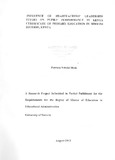| dc.description.abstract | The purpose of this study was to investigate influence of head teachers' leadership styles on pupils' performance in Kenya Certificate of Primary Education (KCPE) in Mbooni Division, Mbooni West District. Researchers have pointed out that, all school reform efforts aim at improving management, teaching and learning that may lead pupils' to access high quality instruction from school leadership committed to pupils' good performance.
This study was guided by five research questions formulated thus, research questions one, two and three sought to establish the extent to which head teachers' leadership styles (democratic, autocratic and laissez faire) respectively influence pupils' performance in KCPE examinations, research question four sought to identify the extent to which headteachers involve teachers, pupils and school management committee(SMC) in discussing academic issues on pupils' performance and research question five sought to establish whether gender, age, academic and professional qualification and administrative and teaching experience influence headteachers' leadership styles. The Path-Goal Theory was used to guide this study as the theory emphasizes on how leaders can facilitate task performance by showing how performance can be instrumental in achieving desired rewards.
The study employed descriptive research survey design. The dependent variable was pupils' KCPE performance while the independent variables were head teachers' leadership styles. The study was carried out in Mbooni Division in Mbooni West District. The 63 public primary schools with 553 practicing teachers formed the study target population. A sample of 240 teachers was selected using stratified random sampling technique. Questionnaire was the instrument used to collect data. Data were analysed using descriptive and inferential statistics. In descriptive statistics, means, standard deviations, bar charts, tables and percentages were calculated.
Independent sample Chi square test and Pearson's Product Moment Correlation Coefficient were the inferential statistics used to test the level of significance at alpha value 0.05. Study findings revealed that autocratic leadership style had a positive and significant influence on pupils' KCPE performance and majority of the head teachers practice democratic leadership style which has positive influence though not significant and finally laissez faire had negative influence and again not significant as well. The study findings further revealed that majority of the headteachers involves teachers, pupils and SMC in discussing academic issues on pupils' KCPE performance.
It was concluded that headteachers' leadership styles had influence on pupils' academic performance in KCPE examination. According to the study findings, there is need to plan and organize capacity building programs to empower practicing head teachers on effective leadership styles in management arena, that may lead to quality output in Kenya Certificate of Primary Education examinations. Finally the study suggested that there is need to conduct research on school related factors and family back ground factors that may influence pupils' performance in KCPE examinations since headteachers' leadership styles influence 22 percent. | en_US |

